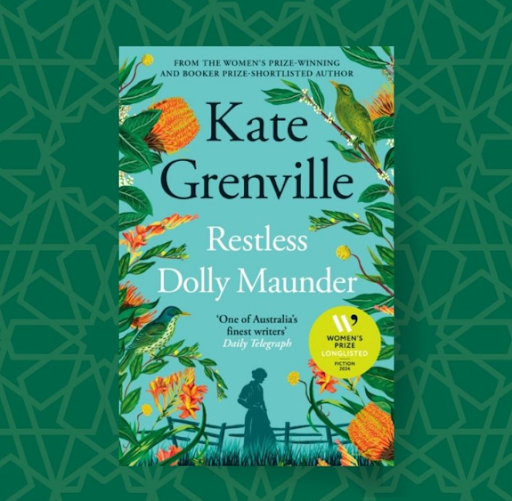This is post 2 / 6 of the Shadowing WPF 2024 series.

Escape from Currabubula
Having struggled with the brutality of ‘The Secret River’, Kate Grenville’s award-winning 2005 fictionalised history of early interactions between settlers and aboriginal people in Australia, I was wary of this one. While less physically violent, it has a similar unsparing interest in responses to pain over long periods of time, and in the reasons for and effects of relocation. Again we have a cockney far from home, Thomas Maunder, a name connoting rambling, but the focus this time is on his daughter Dolly growing up in rural New South Wales in the late 19th century to mid-20th century.
This biographical and historical fiction explores responses to various kinds of pain. In response to having been humiliated, made an object of disgust, Thomas ‘told over the hurts like jewels…so they flashed with his anger’. Similar to her stony husband, his wife turns ‘wooden and silent’ after the death of her favourite son. Both endure lives of relentless manual work, and the children are expected to share the load. Changes in the law concerning compulsory education offer enough schooling for Dolly and her contemporaries, but not the older siblings, to learn to read and write and expand their ambitions.
When they turn 14, however, most are expected back home to work and later, to marry. Thanks to education, there is a slim chance for bright pupils like Dolly to experience another life briefly, as a pupil-teacher at first, and she eyes this possibility as a chink in the wall of her constricting life. We read on to find out the extent to which she can escape, and explore life.
This view of education recalls a bildungsroman about another young woman, Jane Eyre, set about 40 years earlier in England. She also had internal fire and the urge for self-determination, escape from a life beyond endless washing and food preparation. Grenville conveys the maddening repetition of such a life with extensive anaphora reminiscent of folk tale: ‘But before you could put the butter on the bread you had to churn the cream, and before you could churn the cream the milk had to be set out’ and so on.
Enright focuses on the gender roles in farming life, the divisions between male and female rights, but also other divisions. Compulsory education was ‘a fence run through the middle of the family’ and caused resentment. Dolly ‘drew a careful chalk line on the desk’ so that she wouldn’t be jogged by the smelly, fatherless boy who sat next to her. Australian snobberies of origin are explored: ‘the taint’ of those ‘sent out’ as opposed to the ‘free settlers’, for example, and the catholics. Even time is divided, into Before and After the death of Dolly’s brother.
Perhaps the main subject here is the subject of change from one generation to the next. Dolly’s relationships with her own children are sometimes haunted by her own upbringing: ‘Sharpness was the habit of a lifetime. It was the voice she’d heard from her own mother. ..but oh, was there no way to break the old pattern?’ Some problems repeat themselves, while others create room for new kinds of pain, new kinds of life for women. No spoilers, but the revelation at the end of the text makes this new liminal space clear. If opportunity was a door that had been firmly shut, Dolly’s generation ‘was the hinge that it had to be forced around on’, a fitting image to describe the discomfort of Dolly’s restlessness. The novel also encourages us to think about what kinds of men married unusual women like Dolly, and what it was about them that made them enabling partners or otherwise.
Compared to ‘Soldier Sailor’, this is far more linear and clear, divided by date in chronological order, though it does play with genre-blending at the close. It felt deliberately distant, ordered, narrated by comparison, more rational and considered. There is an arm’s-length, shrugging frankness in the way lives are described that I find rebarbative. Dolly had ‘done a few things. Right things, wrong things.’ There’s a reluctance to go further than this, reminiscent of the final couplet of that Armitage poem ,‘Here's how they rated him when they looked back: / sometimes he did this, sometimes he did that.’ It’s not that we need goodies and baddies, but I preferred the near-drowning of reading Soldier Sailor. Will this claim the Bessie for 2024? I doubt it, but it’s a fascinating piece of work.